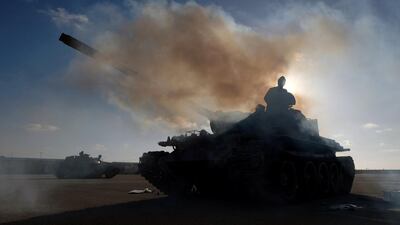The Libyan National Army is unlikely to agree to a ceasefire in the battle for Tripoli, its spokesman has told The National, hours after the UN envoy to the country said a pause in fighting during Eid showed a full truce was possible.
The LNA and militias backing the UN-recognised Government of National Accord in Tripoli halted the five months of fighting on August 10 to mark the Eid Al Adha holidays.
The UN envoy to Libya, Ghassan Salame, told the Security Council on Wednesday this showed that “despite the subsequent relapse of violence, the principle has been established that both parties can commit to a prolonged truce”.
“It is unlikely this will happen," LNA spokesman Ahmed Mismari said. "All of the opportunities that helped avoid a war in Tripoli are over.
"It was a waste of time but the battle is still ongoing and at any moment the city will be liberated."
Mr Mismari said that the Eid truce was simply to mark the religious holiday.
The LNA, which controls all of eastern Libya and has its power base in the city of Benghazi, launched an operation in April to take the capital, saying it was seeking to end the rule of the militias supporting the government.
The group has criticised the Tripoli administration of supporting and being backed by hardline factions, including internationally designated terrorists.
“He [Mr Salame] is welcome to have a political dialogue but he should separate it from the battle against terrorism because terrorist organisations impede the rise of a civil state, a state of law, and even elections because they believe that this is mouharram [religiously forbidden],” Mr Mismari said.
“We have participated in the talks and the international gatherings.
"We met the brotherly countries to discuss political solutions but all solutions failed because the agreements were opposed by either terrorist militias or the ambitions of the terrorist organisations, such as the Muslim Brotherhood, Al Qaeda and ISIS.”
Asked if LNA leader Field Marshal Khalifa Haftar would be willing to meet with the head of the government, Fayez Al Sarraj, Mr Mismari said it would be up to Mr Haftar but, “I think that it is too late after using up all the peaceful methods."
“We are going to fight terrorism wherever it is," he said.
"But after the liberation of Libya we will begin holding a national dialogue to form a unified national government and Parliament, and we welcome any international and Arab participation."
Five months after the start of the offensive to take Tripoli, the front lines have barely shifted. But Mr Mismari denied it was a stalemate.
“We are now on the outskirts of the city," he said. "It is better than fighting them inside the city, which might endanger the lives of people.
"We have planted traps and every time they attack us, we kill them. Eventually, we will rid this country of these elements.
“The enemy will fight as much as they can because this is the last spot they occupy in Libya.”
Mr Mismari criticised Turkey and Qatar for funding and arming the groups. Qatar is providing millions of dollars and Turkey a supply of modern ammunition, he said.
He said the LNA was still using “traditional and old Russian-made weapons and light defensive fighter jets".
Mr Mismari said images circulated of high-tech weapons in the hands of the LNA were “Photoshopped or fabricated”.
Turkey, he said, had been providing drones to the pro-government forces after the LNA destroyed the government’s warplanes in the early phase of the fighting.
Mr Mismari said that the international community was shifting its opinion on the situation in Libya and “starting to trust that the LNA is working towards the stability of the country, and that the war against terrorism is legitimate".
He said that this is why the LNA was now internationally recognised.
Mr Salame said the UN arms embargo on the country had been poorly enforced.
Mr Mismari said that if the ban excluded the LNA, it would be able “stop illegal human trafficking and smuggling”.
He said the problems the country faced today were caused by a lack of good governance after the fall of longtime dictator Muammar Qaddafi.
“Libya lacks good governance. Libyan money is out of the country,” Mr Mismari said.
“We need nationalistic leaders to ensure that the country gets back on track and overcomes this crisis.”


